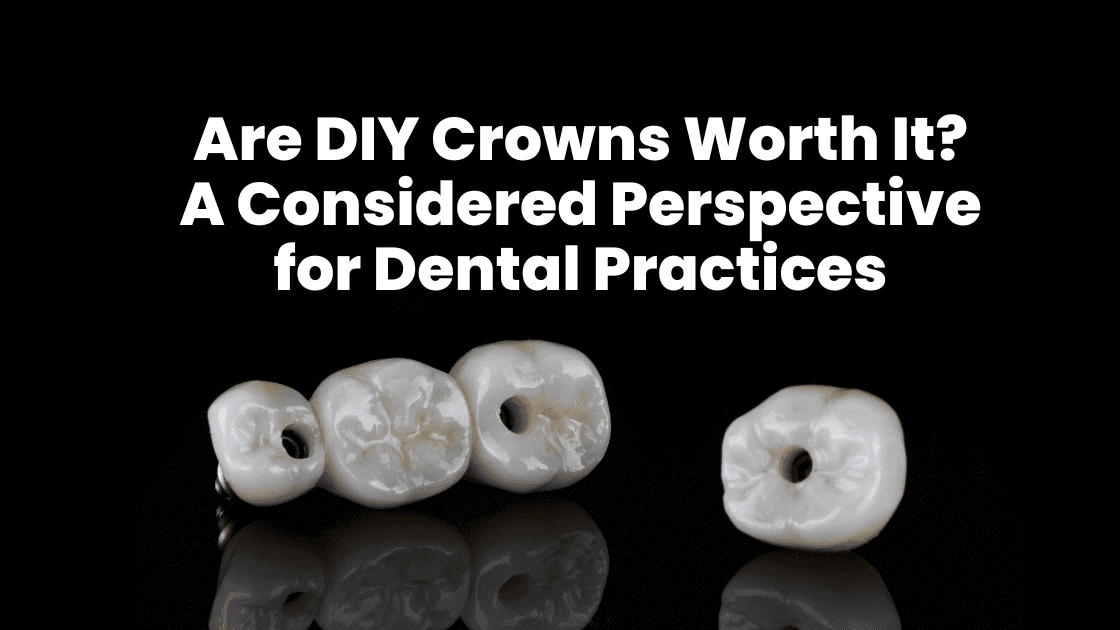
As a leading digital dental lab, we’re often part of essential conversations on the evolution of dental technology and quality care standards. Recently, we’ve seen a growing number of companies offering “crowns for pennies” and promoting claims that “your nurse can do it all,” suggesting that anyone within a practice can take on crown production with minimal training.
At first glance, these propositions seem promising for cost-conscious practices, but a closer examination reveals essential considerations for long-term success.
This article is not about resisting innovation or technological progress but about addressing the realities that practices experience when taking on specific tasks internally—a choice that can lead to increased workload, time management challenges, and the need for continual updates in materials and techniques. We aim to offer a balanced view of sustaining quality care while addressing these operational demands.
Everyone appreciates value, and it’s understandable why a low-cost “25p crown” solution might draw attention. However, while today’s technology generally ensures a decent fit, other critical factors like fracture resistance, contact points, and occlusion alignment can still present challenges.
Producing crowns in-house involves understanding these nuanced technical issues, along with the pressures of evolving regulatory requirements and the rapid advancement of dental materials.
Our lab frequently encounters reports from dental practices that experience unforeseen impacts when implementing these low-cost options internally. While initial savings are appealing, time spent on adjustments, dissatisfaction with minor but critical details, and unexpected costs are common consequences.
These are reminders that quality assurance requires careful planning and specialised knowledge, particularly in patient-facing work.
The financial cost of “25p crowns” extends well beyond the materials and technology. The most significant hidden cost is time—particularly the valuable time of skilled dental surgeons and nurses.
Imagine a dental surgeon or nurse spending hours managing the detailed processes involved in crown production rather than focusing on patient care. Each minute devoted to learning, troubleshooting, and updating in-house systems detracts from the practice’s ability to generate revenue through high-value patient-facing procedures, potentially impacting the quality and efficiency of patient care.
The most successful practices maximise their team’s expertise, allowing them to focus on clinical, patient-centred work rather than managing complex equipment.
History offers lessons in time management and role specialisation that apply well to today’s dental industry. Just as Henry Ford revolutionised production by focusing workers on their strengths, dental practices can streamline their operations by focusing on clinical care and outsourcing technical work to dedicated labs.
Today’s dental practices face unique challenges: the demand to keep pace with rapid changes in dental materials and technology, compounded by increasing regulatory and compliance requirements.
Dental professionals essentially take on the role of a small lab by managing every part of crown creation. While this may seem efficient initially, the time and knowledge required for proper material handling, frequent updates, and compliance adherence make this a choice that could ultimately reduce practice efficiency.
Remake costs extend beyond simple material expenses when a practice takes on crown production. The actual costs of a remake include cumulative impacts on time, profit, and reputation.
Let’s examine the total cost when a remake is required:
Moreover, asking dental nurses to focus on duties outside their core competencies can affect job satisfaction and staff retention. Ensuring highly experienced nurses are engaged in patient-facing tasks rather than troubleshooting equipment optimises their skills and keeps team morale high.
Each remake has ripple effects on practice efficiency and resource allocation:
Every remake directly impacts profit margins, eroding financial gains case by case. For instance, if a crown remake costs £300, the initial profit margin vanishes, and additional revenue-generating cases are required to break even. These hidden, cumulative costs quickly mount, ultimately affecting a practice’s ability to reinvest in growth areas such as patient care, marketing, or team training.
When a practice takes on crown production, it foregoes the highly specialised skills of lab technicians. Labs employ experts in material selection, occlusion, esthetics, and durability—all elements critical to high-quality restorations that stand the test of time. While clinicians may manage the essentials, lab technicians are adept at fine-tuning these aspects to ensure optimal results for both function and appearance, providing a reassuring level of expertise.
The rise of DIY dentistry has increased demand for in-office production, yet studies like the one by Sartori et al. reveal just how critical material selection can be.
For instance, composites like Flexcera Smile Ultra+—which contain ceramic particles—provide greater strength but are more brittle, increasing fracture risk if not handled with precision.
Ivotion, a 3D-milled composite, offers higher fatigue endurance, highlighting the importance of appropriate material selection for patient safety and satisfaction.
Source: Mateus Rocha
Patients don’t always understand the technical details behind crown remakes; they experience inconvenience. Each additional appointment can shape their perception of the practice, with research showing that nearly 40% of patients are less likely to recommend a practice if they encounter issues that require multiple visits. These cumulative experiences affect patient loyalty and can significantly impact practice growth, underscoring the importance of your role in shaping patient perceptions.
Beyond technical and operational considerations, patient trust is paramount. Patients expect the highest quality of care and may lose confidence if they feel that low-cost options compromise their well-being. Practices can build trust by ensuring that materials and processes are chosen with patient interests in mind, ultimately supporting long-term growth and reinforcing the importance of professional integrity when choosing crown production methods.
Nexus partners with practices committed to quality care and patient satisfaction. We see investing in precision-crafted crowns as a strategic investment in a practice’s reputation and long-term success, demonstrating our unwavering commitment to patient care.
In sharing this perspective, we highlight the benefits of focusing on quality from the outset, maximising efficiency, and prioritising patient satisfaction for sustainable growth.